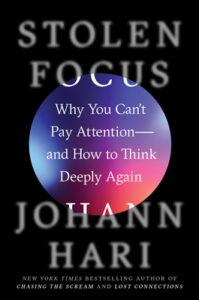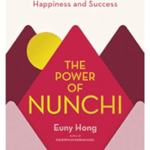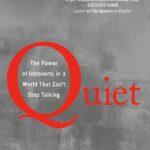Summary
 “Stolen Focus” by Johann Hari is a thought-provoking exploration of the crisis of attention in the modern age. The book delves into the multifaceted reasons behind our diminishing ability to focus and the profound impact this has on our lives and society.
“Stolen Focus” by Johann Hari is a thought-provoking exploration of the crisis of attention in the modern age. The book delves into the multifaceted reasons behind our diminishing ability to focus and the profound impact this has on our lives and society.
- Introduction to the Attention Crisis: Hari begins the book by establishing the current state of our collective attention span. He notes a widespread feeling that people are finding it increasingly hard to concentrate, stay focused, and engage deeply with tasks or thoughts. This phenomenon is not just anecdotal but is supported by research showing a significant decline in average attention spans over recent decades.
- Technological Distractions: A significant part of the book is dedicated to analyzing how technology, especially smartphones and social media, plays a central role in fragmenting our attention. Hari describes how these platforms are designed to capture and hold our attention, often through methods that exploit psychological vulnerabilities. For instance, he discusses the concept of ‘intermittent rewards’ used in social media, where users are kept engaged through unpredictable but rewarding experiences, similar to slot machines.
- Economics of Attention: The author discusses the economic forces driving the attention crisis. In what he calls the ‘attention economy,’ companies profit by capturing and monetizing our attention. This model has led to a situation where tech giants compete to keep users engaged for as long as possible, often at the cost of their well-being.
- Impact on Brain Function: Hari explores the impact of constant distraction on the brain. He discusses studies showing how excessive use of technology can lead to changes in the brain, affecting areas responsible for attention, memory, and emotional regulation. These changes can make it harder for individuals to focus, process information deeply, and manage emotions effectively.
- The Role of Education: The book critically examines the education system and its role in the attention crisis. Hari argues that the focus on standardized testing and rote learning, coupled with the increasing use of technology in classrooms, is not conducive to developing deep attention skills in children. Instead, these practices promote superficial learning and continuous partial attention.
- Workplace Distractions: Hari also addresses the issue of attention in the workplace. He points out how modern work environments, characterized by open-plan offices, constant emails, and meetings, make it difficult for employees to engage in deep, focused work. This environment, he argues, leads to decreased productivity and increased stress.
- Lifestyle and Environmental Factors: The book goes beyond technology and economics to explore other factors affecting our attention. These include lifestyle elements like diet, exercise, and sleep, as well as environmental factors like pollution and urban design. Hari argues that a lifestyle marked by poor diet, insufficient exercise, and inadequate sleep can exacerbate attention problems.
- Political and Social Implications: Hari delves into the wider societal and political implications of the attention crisis. He suggests that an inability to focus and engage deeply with complex issues can lead to a less informed and more polarized society. This situation, he warns, poses a threat to democratic processes and informed public discourse.
- Personal Experiences and Interviews: Throughout the book, Hari interweaves personal anecdotes and interviews with experts from various fields. These narratives add a human dimension to the discussion and provide real-world examples of how the attention crisis is affecting individuals and communities.
- Solutions and Hope: In the concluding sections, Hari doesn’t just present a bleak picture; he also offers solutions. He talks about personal strategies like mindfulness, meditation, and digital detoxes, as well as broader societal and policy changes. These include redesigning tech platforms to be less addictive, reforming the education system to foster deep attention skills, and creating work environments that encourage focused work.
- Conclusion: Hari concludes the book with a call to action, urging readers to recognize the value of their attention and to take steps to protect and reclaim it. He emphasizes that while the attention crisis is a complex and multifaceted problem, it is not insurmountable. Through individual, collective, and policy-level changes, we can work towards a world where our focus is valued and preserved.
“Stolen Focus” is not just a book about the problems of the digital age; it’s a deep dive into the human mind and how our environment and habits shape our ability to think, feel, and connect with the world. Hari’s book is a compelling call to understand and reclaim one of our most precious resources: our attention.
Vocabulary Words
- Myriad: A countless or extremely great number.
- The festival offered a myriad of activities and attractions.
- Eroded: Gradually worn away or reduced.
- The beach’s shoreline has eroded over the years due to the strong waves.
- Bombard: To attack continuously with or as if with bombs; inundate.
- The company bombarded its subscribers with too many promotional emails.
- Neurological: Relating to the nervous system.
- After the accident, she underwent several neurological examinations.
- Fragmentation: The process of breaking or being broken into small or separate parts.
- The fragmentation of the group led to the formation of smaller, independent teams.
- Cognitive: Relating to mental processes such as awareness, perception, reasoning, and judgment.
- Solving puzzles is a good exercise for cognitive development.
- Standardized: To bring into conformity with a standard.
- The test has been standardized to ensure fairness for all students.
- Superficial: Existing or occurring at or on the surface; not thorough or deep.
- His understanding of the subject was only superficial.
- Democratic: Relating to the idea of democracy or democratic principles.
- The new policy was lauded for its democratic approach.
- Detoxes: The process of removing toxic substances.
- She felt rejuvenated after a weekend of digital detoxes.
- Collective: Done by people acting as a group.
- The community garden was a collective effort by the neighborhood.
- Ramifications: Consequences or outcomes, especially complex or unwelcome ones.
- The decision had serious ramifications for the company’s future.
- Anecdotes: Short, amusing or interesting stories about real incidents or people.
- His speech was filled with humorous anecdotes from his travels.
- Inundate: To overwhelm someone with things or people to be dealt with.
- We were inundated with applications for the position.
- Superficial: Lacking depth or significance; shallow.
- Her essay was criticized for being too superficial in analysis.
Discussion Questions
- Which factors affect your ability to focus? (sleep, food, family, stress, social life,other)
- Which types of things are you most/least able to focus on?
- Do you think of yourself as an empathetic person?
- When you listen to someone else’s problem, do you focus and just listen or are you thinking about your own situation or what you want to say next?
- Other than assignments, how much sustained reading do you do?
- How long can you sustain uninterrupted study without checking your phone or being distracted by something else?
- Are you a good multitasker? How so?
- What are your most enjoyable distractions?
- How much time do you spend using your phone on an average day?
- Check your phone stats. How much screen time?
- Do you think technology has positively or negatively impacted our ability to focus? Why?
- Can the design of educational systems and workplaces be changed to improve focus? If so, how?
- What role does diet and lifestyle play in our ability to concentrate?
- How does the attention economy affect our daily lives and decision-making?
- Is it possible to balance the use of digital technology without losing focus? How?
- How do social media platforms manipulate our attention?
- What are the long-term effects of reduced attention spans on society?
- Can individual practices like meditation really help regain our focus? Why or why not?
- Should governments regulate tech companies to protect our attention? Why or why not?
- How does the attention crisis affect our understanding and engagement in politics?
- What are the psychological effects of constant digital distraction?
- How can we create work environments that encourage deep work?
- What are the differences in attention spans across various age groups?
- How does multitasking impact our productivity and focus?
- Are there any positive aspects of a fragmented attention span?
- How has the pandemic affected our attention spans and focus?
- Can redesigning social media platforms help in reclaiming our focus?
- How do different cultures view the concept of focus and attention?
- What are some collective solutions societies can adopt to address the attention crisis?
- How does the attention crisis influence creativity and innovation?
Debate Topics
- “Regulating social media companies is essential for protecting our attention.”
- “The education system is responsible for the declining attention spans of students.”
- “Digital detoxes are more harmful than beneficial for managing focus.”
- “Technology has improved rather than harmed our ability to focus.”
- “The attention crisis is exaggerated and not as severe as portrayed.”
- “Workplace redesign is crucial for addressing the attention crisis.”
- “The government should implement policies to limit screen time for children and adolescents.”
Views: 189






Leave a Reply